D**k pics, masturbation, rape threats, 1600 complaints: Police DV inquiry’s latest shock revelations
The state’s top cop has taken the stand at the inquiry into Queensland police responses to domestic violence, as it hears more damning evidence.
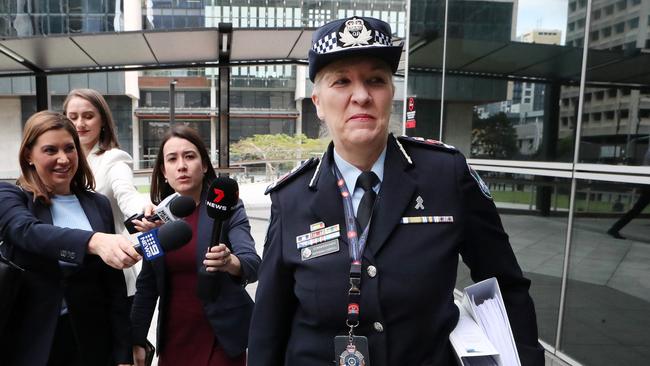
Police & Courts
Don't miss out on the headlines from Police & Courts. Followed categories will be added to My News.
Police Commissioner Katarina Carroll has for the second time given evidence at the commission of inquiry into Queensland Police Service responses to domestic and family violence.
It comes after submissions were sensationally reopened following her first round of evidence to the inquiry in August.
Counsel assisting Ruth O’Gorman said the inquiry had requested two years of data from the Queensland Police Service on complaints against officers of threatening, harassing and bullying behaviour.
The inquiry was provided with data showing 1676 complaints were made against 738 members of the QPS.
She said the data related to complaints made between June 30, 2020 to June 30, 2022.
Many of those complaints related to sexist, racist, misogynistic and homophobic behaviour.
COP’S D*** PICS, MASTURBATION VIDEO, RAPE THREATS
On Wednesday the inquiry heard that in 2019, a female officer contacted Task Force Juniper to make a complaint about a male senior constable at her station.
The investigation soon found three women had suffered inappropriate behaviour from the man.
Ms O’Gorman said the man sent one of the women messages on various platforms seeking an intimate relationship and when she said no, he threatened her.
The threats included that he would break into her house and rape her and sabotage her future relationships.
He sent her unsolicited pictures of his penis, videos of him masturbating, and touched her inappropriately at work – including on the outside of her vagina over her clothes.
A second female police officer received messages on social media from the man asking her for oral sex, pictures of his penis and was also subjected to unwanted touching.
A third female officer received a series of inappropriate messages including pictures of the man holding his penis.
The Juniper investigation also found the man had sent unsolicited pictures of his penis to women on dating sites.
Ms O’Gorman put to Ms Carroll that the man’s conduct was widely known – even by management – and was allowed to continue.
Only one woman made a complaint, with the others telling investigators they did not want to be “perceived as a dog”.
Ms Carroll said it was “extraordinarily disappointing” that management knew about some of the behaviour and did not act.
The inquiry heard 24 allegations against the man were substantiated and he resigned before action was taken against him.
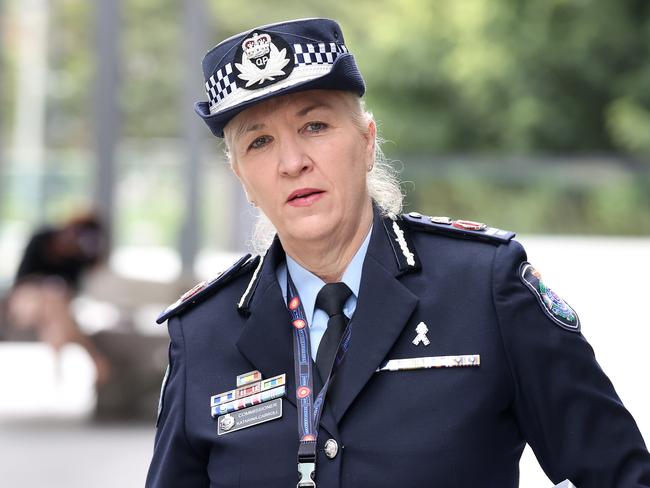
In another incident, a male senior constable made unwanted advances to a female constable over a four-month period in 2018, when he regularly harassed her, sent her suggestive text messages in which he called her “baby” and “detective sexy”, and squeezed her leg in a surveillance car.
After a Christmas party he kept texting her and turned up to her house.
After confronting the officer she told an inspector who told a superintendent. She was told the officer would be moved elsewhere for a period of time.
She later had to work with the officer and made a formal complaint about the sexual harassment after she was told she should move desks.
A superintendent conducted the local managerial guidance and said “mate I’m sorry to have to do this to you” during the conversation with the senior constable, adding he didn’t want to blame the officer.
The senior constable claimed the messages were misconstrued and “it was a joke” and the matter was finalised.
Two years later the female constable resigned from the police service and in her exit interview said the main reason was harassment from staff and being victimised and bullied by another staff member and ostracised in the workplace.
Ms O’Gorman said it was another case of “paying the price of being the victim”.
Ms Carroll responded: “Yes she is the victim. She should have been treated a lot better than this. And she paid the price.”
The superintendent who approved managerial guidance for the senior constable was himself the subject of a complaint six months later, when he made a derogatory statement about a female senior constable during a panel interview.
Ms O’Gorman told the inquiry about a series of complaints made against male police officers – mainly sergeants and senior constables – who were dealt with by local managerial guidance over repeated incidents of sexual harassment.
The complaints included a sergeant who repeatedly asked male colleagues “would you like to lick their m**” when referring to female members of the public and another who harassed three female colleagues, including asking them questions like whether they enjoyed anal sex.
Another officer directed unwanted attention at a female first year constable until she left the station to work somewhere else, including sitting on her desk, sitting overly close to her and even changing their rosters so he could find reasons to be alone with her.
In each case, Ms Carroll agreed the officer should not have been dealt with by local managerial guidance.
SHOCK BEHAVIOUR AT CALLOUT
Ms O’Gorman said a police officer had anonymously sent body-worn-camera footage to the inquiry showing police responding to a domestic violence call.
The inquiry heard the woman who needed help told police her partner was not a criminal, but was going through psychosis and needed help.
Ms O’Gorman said the footage revealed officers called the man a “f---ing drug-f---ed piece of shit”, a “f---ing loser every day of the week” and other abusive names.
The inquiry heard the woman became distressed as her partner was arrested, asking, “Is he injured, has he been brain-damaged?” to which an officer replied, “Let’s hope so.”
Ms O’Gorman said the woman was then called a “f---ing dumb slut” by one of the officers.
The inquiry heard that situation was reported internally and dealt with by local managerial guidance.
OFFICER’S 80 OFFENCES AGAINST 26 STAFF
Ms O’Gorman spoke of a detective senior sergeant who was found to have harassed or bullied 26 staff members and was the subject of 84 allegations, of which 80 were substantiated.
She said the detective’s behaviour came to light when a female senior constable made a complaint to the ethical standards command in 2019.
“This conduct included sexual harassment, sexual assault and predatory behaviour which was directed primarily at junior female members of his unit – and the majority of the women were under his direct supervision,” Ms O’Gorman said.
“A large amount of that conduct occurred over a three-year period between 2016 and 2018.
“(But) the investigators found his conduct went all the way back to 2002.”
Ms O’Gorman asked Ms Carroll whether she accepted that this detective’s behaviour went unchecked for many years.
“Yes,” she said.
“That should be alarming shouldn’t it, that for more than a decade, this particular senior sergeant was permitted to engage in behaviours that were sexist and misogynist and about which no-one made a complaint,” Ms O’Gorman said.
“That is alarming,” Ms Carroll said.
Ms O’Gorman told the inquiry the man was found to have committed nine sexual assaults, one attempted sexual assault and other sexualised communications over messaging platforms, as well as sexualised comments.
She said his conduct included giving female colleagues unwanted shoulder massages, touching them regularly by placing his hand on their shoulders, waist or legs, playing with their hair or hugging and kissing them.
“All very creepy behaviour to be engaged in by a detective senior sergeant … on the younger women in his unit,” Ms O’Gorman said.
“Definitely,” Ms Carroll replied.
She said investigators found all of the detective’s conduct was unsolicited and unwanted.
On one occasion, the inquiry heard the detective followed a female officer into the women’s bathrooms.
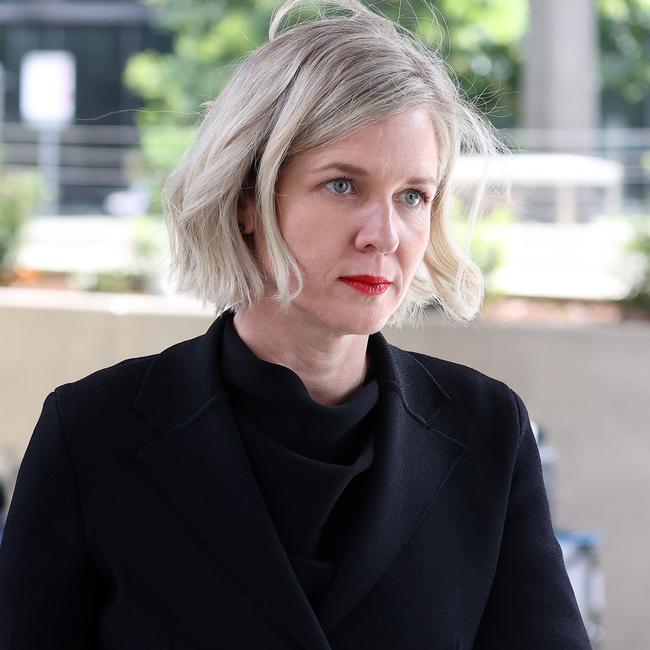
“When she confronted him about why he was there, he winked at her, laughed and said ‘don’t be like that, I was told I could come in here for a blowjob’,” Ms O’Gorman said.
The inquiry heard the woman was “rattled and shaking” when she returned to work.
Ms O’Gorman said on another occasion, the detective was about to interview a female senior constable for a position when he touched her inappropriately.
“She was waiting outside the room waiting to go into the interview,” Ms O’Gorman detailed.
“He walked past her, slid his hand over her bottom, up her back and onto the bottom of her bra … he walked, without speaking to her, having touched her in that manner, into the interview room and then joined the interview panel.
“During the course of the interview, one of the other male police officers siting on the panel passed this male police officer a piece of paper that said ‘loose’ with a question mark.
“And this male officer, having sexually assaulted this female officer outside the room, then nodded in acknowledgment, ‘yes she’s loose’.”
“It’s deeply disturbing isn’t it?” Ms O’Gorman asked the police commissioner.
“It’s disgusting, it’s predatory, it’s unacceptable, I completely agree with you,” Ms Carroll replied.
The inquiry heard the woman did not make a complaint and did not do well during the interview having been “highly rattled” by the detective’s behaviour.
Ms O’Gorman said she did not get the job.
“I would expect I would be exactly the same,” Ms Carroll said.
“It’s unfair that women in your organisation find themselves in positions, from time-to-time, the subjects of sexist and misogynistic conduct, which is not only deeply hurtful and traumatic but is prone to directly impact on their ability to progress in their career,” Ms O’Gorman said.
Ms Carroll said: “It’s completely wrong, it’s not just hurtful, it’s long term trauma.”
Ms O’Gorman said on yet another occasion, the same detective walked up behind a female police officer, hugged her from behind and cupped her breast.
“He told another female police officer he supervised ‘f---, you look so hot right now, I’d love to slam you into those cabinets, what I could do to you’,” Ms O’Gorman said.
The inquiry heard at another interview panel, after a woman applied for an administration position, the detective said to a colleague: “Have a look at her, she has great tits and a great arse.”
The inquiry heard the detective spent some time on sick leave before medically retiring from the service.
OFFICER’S LEWD SUGGESTION TO FEMALE COLLEAGUE
Ms O’Gorman also described a recent investigation that arose out of a 2021 workplace survey.
She said after the survey revealed a high level of disengagement within a particular unit, officers were approached.
The inquiry heard the staff at that unit had to be compelled to speak because they were worried about the impact on their careers if they complained about a senior officer.
Ms O’Gorman said an investigation then determined a detective senior sergeant had engaged in workplace sexual harassment and bullying over a two-year period.
She said a final hearing was yet to occur in relation to the officer.
She said some of the incidents included the officer making persistent sexualised comments, including repeatedly discussing his penis.
The senior officer had an item on his desk and would invite female colleagues to “come in and have a sit on his knob”, Ms O’Gorman said.
In another case, the inquiry heard the officer had a senior female detective join the unit, telling colleagues he had a sexual interest in her.
Ms O’Gorman said he would tell colleagues “trust me, I know” when referring to what her genitalia looked like.
She said he showed pornography to junior members and downloaded a photograph of a female colleague in activewear from her social media, shared it and made sexualised comments about her.
She said two male colleagues moved elsewhere after being bullied by him while another described him to investigators as a “creepy old man” who behaved in an “outrageous” way.
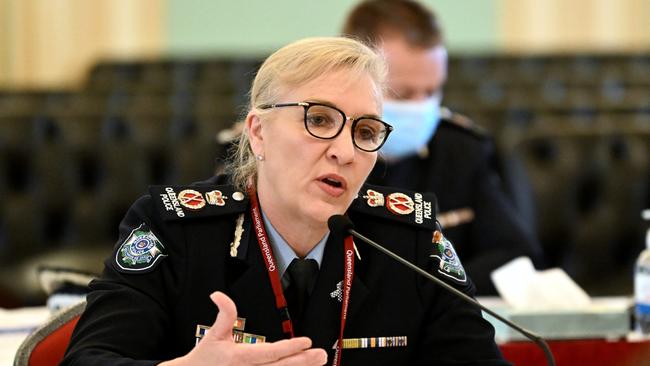
In one substantiated allegation, the inquiry was told a senior constable at a station being managed by a female superior for poor workplace behaviour, had applied for a relieving position but she had refused.
In the presence of four or five other officers he said: “She is nothing but a c**t and if she doesn’t give me a relieving role I’m going to punch her in the c**t.”
A colleague who heard him speak was concerned about what was said but that it also may pose a risk to her.
He told the female officer in charge who then made a complaint to the Ethical Standards Command.
The officer was dealt with by local managerial guidance and was told to make a written apology to the senior officer, on September 14, 2020, two years after the incident happened.
Ms O’Gorman said she imagined it was “deeply unsatisfactory” for the officer-in-charge to receive a forced apology two years later.
She also questioned whether the local managerial process was insufficient.
“When I look at this every aspect of it has been dealt with inappropriately,” Ms Carroll said.
Three years earlier in 2016, the senior constable was tasked to investigate DV at a job in an undisclosed place in Queensland. He interviewed the victim and perpetrator and the victim left and stayed in accommodation.
When he returned to the station he finalised the matter as “NO DV”.
But a constable with him on the job said it was DV, noting the man had admitted to making threats he would punch the women in the face and kick her children in the guts.
The DV order was later applied for by police and granted.In 2017 the senior constable was provided local managerial resolution in relation to how he dealt with the investigation.
Ms O’Gorman questioned the commissioner on whether she accepted the service did not know the full extent of sexist and misogynist conduct that is made by officers.
However Ms Carroll said she had a reasonable understanding because the QPS survey results said 1-2 per cent of people were subject to sexual harassment in the last 12 months, which aligned with other public service agencies.
The inquiry heard multiple officers who wrote submissions were told they didn’t want to make complaints because they would be labelled a “dog” by colleagues and face adverse consequences. There were also fearful of being identified in the submission process to the inquiry.
One who wrote said they had been given a dog bowl while another said they had heard of colleagues having dog food placed on their desks.
Ms Carroll said she accepted there were cases that had fallen through the cracks that she was not aware of.
Ms O’Gorman told the inquiry of another matter where a senior officer was given local managerial guidance despite having been found to have bullied 15 officers over a 13-year period.
She said the conduct included yelling, making threats, swearing, openly criticising staff, referring to colleagues by inappropriate names and displaying inappropriate material in the office.
Ms O’Gorman said the investigation into the officer-in-charge’s behaviour began when a female senior constable made a complaint.
She said a “broader investigation” then commenced, with the allegations later substantiated.
“What we found in respect of that matter (was) throughout the investigation, the officer-in-charge remained in his role and was provided opportunities to relieve in higher roles elsewhere,” Ms O’Gorman said.
She said his conduct also involved sending pornographic images to other officers in his station and referring to two female officers by saying “those knickers will never get a job in this office”.
Ms O’Gorman said at a point in time where there was only one woman working in the unit, he allowed sexist material to be displayed in the office, including a photograph on a fridge of a woman in a swimsuit with the words “tap and go”.
She said the man also referred to a colleague as a “towel head” and “Osama”.
“I think we’ve established the conduct was poor,” Ms O’Gorman said to Ms Carroll.
“Yes,” she replied.
“It was inappropriate in the circumstances that he was dealt with only by local managerial guidance,” Ms O’Gorman said.
“Yes,” Ms Carroll replied.
“We can see this conduct went on for 13 years against 15 officers,” Ms O’Gorman said, adding that Ms Carroll had earlier said local managerial guidance was for minor, one-off behaviours.
Ms O’Gorman said after being given local managerial guidance, the man was later promoted to the officer-in-charge of a larger station.
The inquiry was told the female officer’s career had been damaged.
“She remained at the station … when he came back to the station she felt she had no choice but to leave to avoid him,” Ms O’Gorman said.
“What we have heard is she has now left her detective specialist role that she was in, she is now in uniform in general duties.”
Ms O’Gorman said the officer had paid a high price for reporting the sexist and misogynist remarks and had to leave her role as specialist while the officer-in-charge stayed.
She asked if it would be reasonable for female members to have a deep fear of making these types of complaints given people knew the outcome of the complaint made by the female officer who had to pay the price and leave her role.
Ms Carroll responded: “Deep fear of speaking out but also losing confidence in the discipline process that should be protecting them.”
‘VAGINA WHISPERER’ COP WAS FACING SECOND COMPLAINT
Police Commissioner Katarina Carroll has told an inquiry into police responses to domestic violence there was a second complaint about former Deputy Commissioner Paul Taylor when she disciplined him for making inappropriate comments at a conference.
Mr Taylor resigned from the service after it emerged he’d referred to a gynaecologist friend as a “vagina whisperer” at a leadership conference in April 2022.
Asked why she disciplined him only with local managerial guidance – which involves a conversation with a more senior officer – she said it was because she expected he would suffer more serious consequences relating to a separate complaint.
She said she expected the second complaint would be resolved very quickly but it still hadn’t by the time she gave evidence at the inquiry in August.
Mr Taylor resigned the day after the “vagina whisperer” comment was made public.
“I honestly believed that (second) matter would be finalised a lot sooner,” Ms Carroll said.
“I honestly believed it would be done.”
She said she believed the outcome of the other complaint would be “much more serious”.
Ms O’Gorman put to Ms Carroll that she had a “private chat” with Mr Taylor because anything more serious could have resulted in media attention.
“Definitely not, definitely not,” Ms Carroll said.
“In fact, the action I was intending to take was going to have a lot of media attention in relation to the (other complaint).
“So either way there was going to be a lot of media attention.”
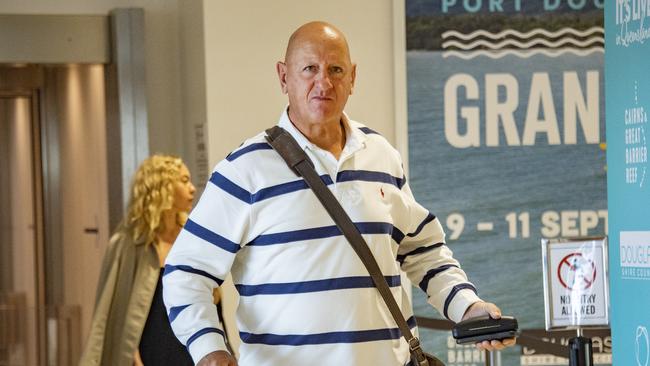
Ms Carroll agreed that the second complaint could have resulted in Mr Taylor being dismissed from the service.
She said she spoke to Mr Taylor on the day of the inquiry hearing in August where information about his conference comments emerged.
“Straight after the hearing we had a quick conversation in my office,” Ms Carroll said of the meeting.
“I said Paul this is damaging to you and this organisation.
“And he said I should resign.
“And I said I completely agree with you.”
Ms Carroll said she would have asked him to resign if he hadn’t offered his resignation.
The inquiry was told after Chief Superintendent Ray Rohweder made lewd comments at a separate leadership conference in March, he was dealt with by local managerial guidance within about a week.
After Mr Taylor made his comments in April he was dealt with on June 10.
The inquiry was told Mr Rohweder said “if it’s OK for Mr Taylor, it’s OK for me”, at the time Mr Taylor made his comment at the senior leadership conference.
Mr Rohweder was promoted to Chief Superintendent on June 23.
Ms O’Gorman said the comment suggested Mr Rohweder had a “lack of remorse” over the comment.
Ms Carroll said she didn’t want to promote Mr Rohweder but the managerial guidance and promotion process were separate.
“I would have rather not promoted him and I was of the view, and I would say correctly so, that he would be successful in appealing that decision,” Ms Carroll said.
At the time she signed off on the promotion she said she was not aware of the later comments Mr Rohweder made.
POLICE CHIEF’S FIRST GRILLING AT DV INQUIRY
Faced with intense questioning of the service, Ms Carroll denied a widespread cultural problem with police. But she agreed there were issues relating to sexism, misogyny and racism.
Deputy Commissioner Paul Taylor resigned a day after the DV inquiry heard he’d referred to a gynaecologist friend as a “vagina whisperer” during a formal speech at a leadership conference in front of other senior police.
The inquiry also heard another senior officer, Chief Superintendent Ray Rohweder, called out “did she shut her legs on you”, after the MC of a separate leadership conference joked about a “rough promotional process” while referring to a cut on his face.
Both Mr Taylor and Chief Supt Rohweder were dealt with at the time with “local managerial resolution”, which involved a discussion with a more senior officer about their behaviour.
Chief Supt Rohweder is on leave and the service has said Ms Carroll is seeking legal advice about the officer.
DFV inquiry Commissioner Judge Deborah Richards said it was “necessary” to re-open submissions after current and former members contacted the inquiry following Ms Carroll’s August evidence.
The commission of inquiry then received more than 250 submissions.
The Courier-Mail has also confirmed the inquiry has requested all disciplinary records of the executive leadership team who are state’s most senior police.
Ms Carroll is expected to give evidence on Wednesday and Queensland Police Union president Ian Leavers on Friday.
The inquiry was called after a recommendation from the Women’s Safety and Justice Taskforce.
In a submission to the DV inquiry — before Ms Carroll was called to her first hearing — she said there had been evidence provided to the inquiry of “negative and concerning workplace behaviours”.
Ms Carroll said evidence had suggested a “widespread culture of misogyny, sexism and racism in the QPS, or beliefs and values that do not align with the organisational values, and our ethos of caring for victims,”
She said the term “widespread” was not easy to quantify.
“What I have seen from victims who have come forward to the Taskforce and Commission of Inquiry clearly shows me there are cultural issues in areas around the state of Queensland,” Ms Carroll wrote.
“However, the term ‘widespread’ to me implies that there are entrenched and ingrained cultural issues with all, or the majority of us in the service. I do not accept this.
“I accept that there are some people in the organisation who do not act in the manner expected, and where we identify this, we do take action. The fact that 30% of all complaints about police are generated by police, tells me that the QPS are committed to addressing inappropriate behaviour.”
The report from the inquiry is due to be completed by November 14.




